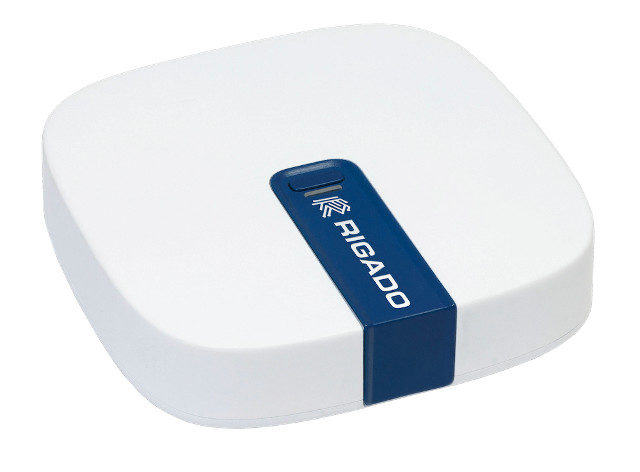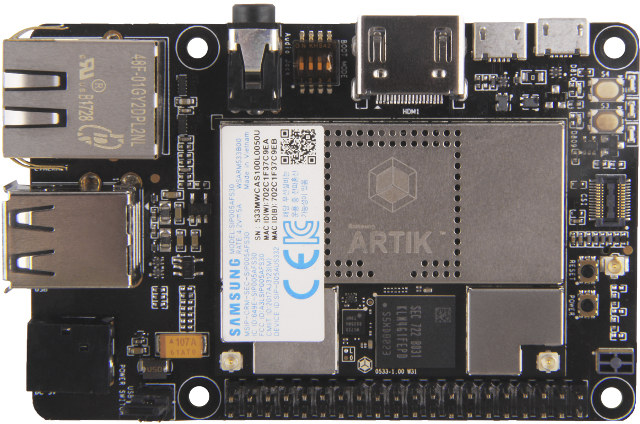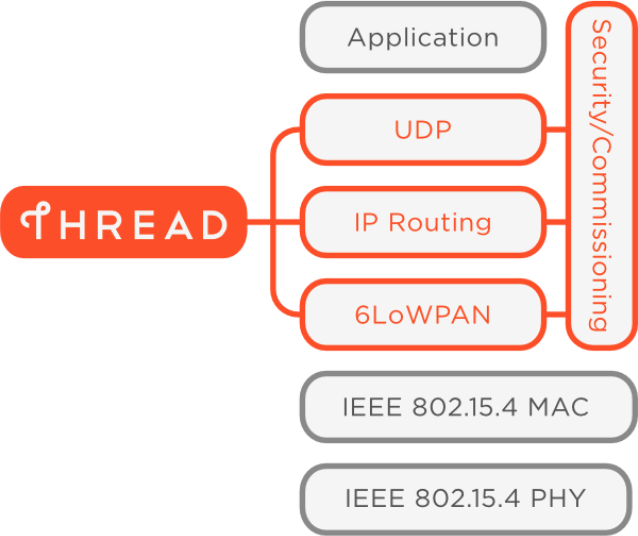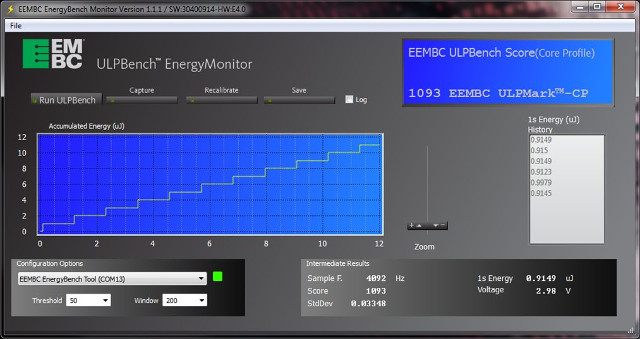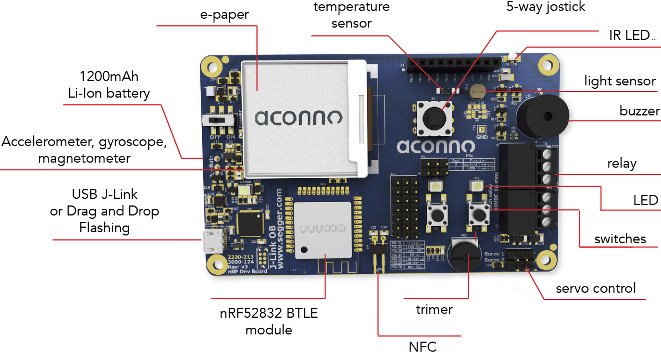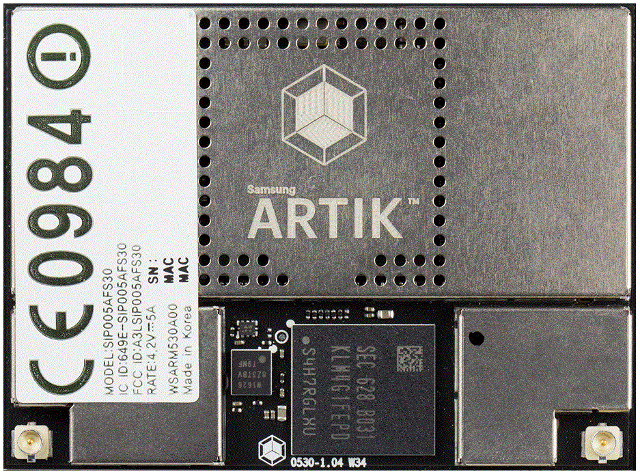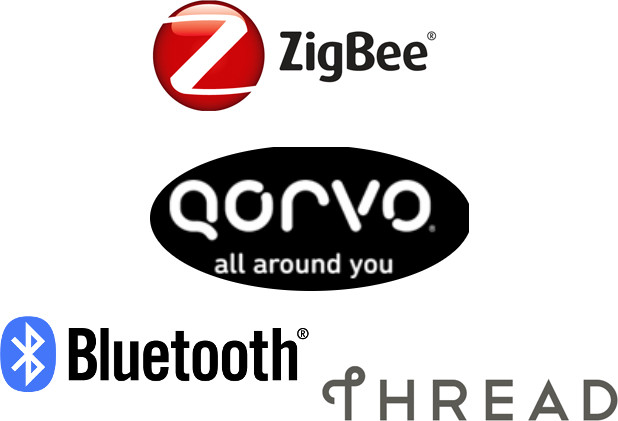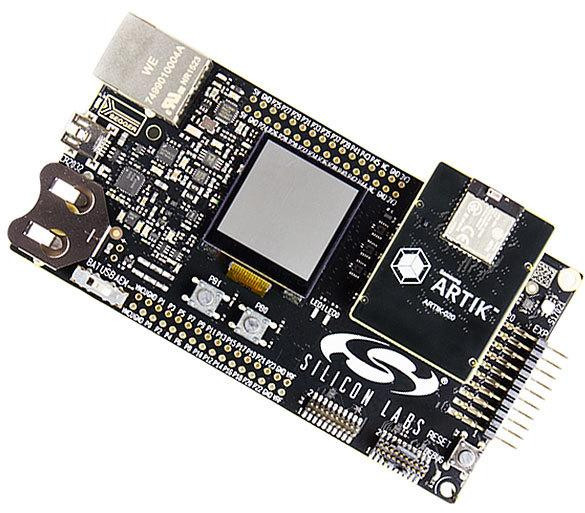I’ve recently read several open source software news related to Rigado IoT gateway, starting with Canonical announcement last month, that the gateway would ship with Ubuntu Core starting in summer 2018, and a few days ago it popped up again during Linaro CEO keynote at Linaro Connect HK 2018, as one of the first commercial devices to run the Zephyr OS, specifically its fully open source Bluetooth stack on a Nordic nRF52 chip. Rigado Vesta IoT gateway is not exactly new, as it was first announced in December 2016. The hardware relies on an NXP i.MX 6UL Cortex A7 processor, up to 256MB RAM, 4GB eMMC flash, and includes built-in support for dual band WiFi, Bluetooth Smart, Bluetooth 5/4.2, 802.15.4 (Thread), Fast Ethernet with PoE, as well as optional support for a cellular LTE Cat 1 modem. Rigado gateway hardware specifications: Processor – NXP i.MX6 UltraLite (G3) Arm Cortex A7 […]
Eagleye 530s Board Features Samsung Artik 530s IoT Module, Leverages Raspberry Pi Form Factor
Samsung Artik 530 is a module designed for the Internet of Things based on a quad core Arm Cortex A9 processor, and supporting Ethernet, dual band WiFi, Bluetooth 4.2, and 802.15.4/Zigbee/Thread connectivity, as well as exposing display and camera interfaces, and of course various I/Os. The module was launched about one year ago with a developer kit that cost $189 and up, but Samsung has now worked with Seeed Studio to launch a cheaper developer board – called Eagleye – based on the secure version of the module (Artik 530s) and mostly following Raspberry Pi form factor in order to take advantage of its hardware ecosystem. Eagleye 530s board specifications: SoC – Unnamed quad core Arm Cortex A9 processor @ 1.2GHz with 3D graphics accelerator System Memory – 1GB DDR3 Storage – 4GB eMMC flash, SD card slot Connectivity 802.11a/b/g/n dual band SISO (2.4G/5G) Bluetooth 4.2(BLE+Classic) Zigbee/Thread 802.15.4 Gigabit Ethernet […]
Google Announces LoWPAN/Thread Support in Android Things DP 6.1
Not to be confused with LPWAN (Low Power Wide Area Network), LoWPAN (Low Power Wireless Personal Area Network) solutions are designed for peer-to-peer usage on constrained battery-powered devices using standard procotols like HTTP and CoAP. Based on 6LoWPAN and 802.15.4, Thread is one of those LoWPAN standards, and Google has just added API support for configuring and managing LoWPAN as a part of Android Things Developer Preview 6.1, including networking support for Thread. Google explains “these types of low-power connectivity solutions enable Android Things devices to perform edge computing tasks, aggregating data locally from nearby devices to make critical decisions without a constant connection to cloud services”. You can read LoWPAN API guide to learn more details on building your own apps to create and join local mesh networks, but to quickly get started OpenThread running on Nordic Semi RF52840-PDK is recommended. You’ll first need to install the firmware and […]
EEMBC IoT-Connect is a Family of Benchmarks Designed To Test the Power Efficiency of IoT Devices
EEMBC, the Embedded Microprocessor Benchmark Consortium, has been providing benchmarks for embedded systems since 1996, including ULPBench helping to rank micro-controllers by their power efficiency. But with the Internet of Things gaining traction, it’s important to test more than just the MCU core’s power efficiency, and having a benchmark taking sensors and connectivity into account would be useful. That’s exactly what EEMC IoT-Connect benchmark family aims for with the three main characteristics: Provides flexibility to accommodate various communication protocols (e.g. Bluetooth, Thread, LoRa, WiFi) Portable to work with any vendor’s microcontroller and radio-module products Compatible with EEMBC ULPBench and EEMBC IoT-Secure benchmarks The first benchmark of the family is IoTMark-BLE connectivity profile that supports Bluetooth (LE) MCUs. The benchmark requires fixed payload size, frequency of transmission, and transmit power, and performs a complete sequence of event ranging from sensor reading, to BLE notifications, and command write and CRC. The IoT-Connect […]
Aconno Bluetooth 4.0 & 5 IoT Development Board Features an nRF52832 or nRF52840 Module, an e-Paper Display, Sensors and More
Bluetooth 5 is the latest iteration of Bluetooth with up to four times the speed and twice the range of Bluetooth 4.0 LE, and so far apart from Puck.js and Nordic Semi nRF52840 devkit, I had not seen many Bluetooth 5 IoT modules or boards. Aconno, a German startup, has designed ACD-52832 Bluetooth 4.0 / Thread / ANT+ IoT development board based on their own nRF52832 module, and equipped with some goodies like a black & white e-Paper display, a joystick, sensors, I/Os, etc… They’ve also launched an updated module with Bluetooth 5 using nFR52840 SoC. I don’t have the full details about the new module, but the nRF52832 module and devkit is interesting to look at, especially features should be similar. Aconno ACD-52832 board specifications: Wireless Module – ACN52832 based on Nordic Semi nRF52832 ARM Cortex-M4 @ 64 MHz SoC with Bluetooth Smart, ANT+, Thread, NFC, and 2.4 GHz […]
Samsung Introduces Artik 530 IoT Module & Development Kit with WiFi, BLE, and Zigbee/Thread
Samsung unveiled Artik 1, Artik 5, and Artik 10 IoT modules & development board families in 2015, but since then they dropped the Artik 1 family, and instead launched Artik 0, Artik 5, and Artik 7 modules and boards late last year. More recently the company canceled the more powerful Artik 1020 development board, but the Artik project is still going on, as they’ve just added Artik 530 module & development kit to their Artik 5 family. Samsung ARTIK 530 module specifications: SoC – Unnamed Quad core ARM Cortex A9 processor @ 1.2 GHz with a 3D graphics accelerator System Memory – 512 MB DDR3 Storage – 4GB eMMC v4.5 flash Connectivity – Dual band SISO 802.11 a/b/g/n WiFi, Bluetooth 4.2 LE + Classic, 802.15.4/Zigbee/Thread, 10/100/1000M MAC (external PHY required) Other Interfaces and peripherals Camera – 4-lane MIPI CSI up to 5MP (1920×1080 @ 30fps) Display – 4-lane MIPI DSI […]
Qorvo GP695 “Smart Home” SoC Integrates 802.15.4, Zigbee 3.0, Thread, and Bluetooth LE
GreenPeak Technologies ultra-low power, short range RF communication technology company was acquired by Qorvo last year, and Qorvo has recently announced a GP695 system on chip (SoC) for smart home devices part of GreenPeak’s previous family of devices, and supporting multiple short range RF protocols. GP695 key features: MCU Core – ARM Cortex M4 Connectivity IEEE 802.15.4 ZigBee 3.0 Thread Bluetooth Low Energy (BLE) Qorvo Wi-Fi interference mitigation technology GP695 has been designed to be used in device such as a door locks, smart HVAC, smart security systems, connected video doorbells and intercoms, lightbulbs, smoke alarms, and leak detectors, and complements GP712 multi-protocol SoC designed for smart home gateways. Qorvo will feature live demonstrations of its smart home and IoT solutions at its booth during CES 2017, at Sands Expo, Halls A-D Booth #42114. There’s very limited public information, and no product page could be found in their website. Jean-Luc […]
Samsung Introduces $5 ARTIK 0 and $50 ARTIK 7 Smart IoT Module Families
Samsung unveiled ARTIK 1, 3 and 5 boards for the Internet of Things in 2015, and started to sell them, together with development with WiFi, BLE and Zigbee connectivity earlier this year. The Korean company has now announced two new family with ARTIK 0 modules powered by an ARM Cortex-M MCU and destined to be used in HVAC, lighting, industrial sensors, personal health monitoring and more, as well as ARTIK 7 family powered by an Octa-core Cortex A53 processor, and targeting IoT gateways. ARTIK 0 Family ARTIK 0 family is now comprised for ARTIK 020 with Bluetooth, and ARTIK 030 for applications requiring Thread and/or Zigbee. Beside the different radios, both modules share the same key features: MCU – ARM Cortex-M4 up to 40 MHz with Floating Point Unit, 256KB flash, 32 KB SRAM, advanced hardware cryptographic engine with support for AES-128/-256, ECC, SHA-1, SHA-256, and a Random Number Generator […]


